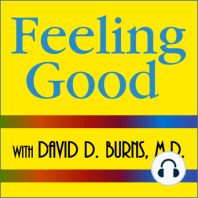50 min listen

221: Ask David: What's Your Definition of a Violent Person? Five Cool Questions from Listeners Like You!
221: Ask David: What's Your Definition of a Violent Person? Five Cool Questions from Listeners Like You!
ratings:
Length:
61 minutes
Released:
Dec 21, 2020
Format:
Podcast episode
Description
Podcast 221 Ask David December 21, 2020 Today’s Ask David features five challenging questions submitted by listeners like you! Sumaya asks: I recently bought Feeling Great and can’t find the chapters on Habits and Addictions in the book. Could you please clarify? Jay asks: Can you provide more specific information on the contrasts between Feeling Good, The Feeling Good Handbook, and Feeling Great? Rizwan asks: How would you use the Five Secrets to respond to a truly irate patient? Casey asks: How do you treat resistant autism patients with All-or-Nothing Thinking? Debby asks: What’s your definition of a violent person? Today’s podcast begins with season greetings for people of all (or no) religious faiths. Rhonda reads a moving email submitted by a listener who was helped by the recent two-part Sunny series on the Approval Addiction. David gives a plug for his upcoming workshop with Dr. Jill Levitt on “Defeating the Beliefs that Defeat You and Your Patients” on February 28. 2021 (include link.) We also give a shout for Sunny’s recently opened private practice, which offers super rapid treatment and a user-friendly fee schedule. Sunny can be reached at: Sunny Choi, LCSW sunny@bettermoodtherapy.com Better Mood Therapy rhonda's exciting new Feeling Great Treatment Center is now open for business as well. She can be reached at rhonda@feelinggreattherapycenter.com. And now—your cool questions! * * * Sumaya asks: I recently bought Feeling Great and can’t find the chapters on Habits and Addictions in the book. Could you please clarify? David explains that the two “lost” chapters on habits and addictions are available for free on the homepage of www.feelinggood.com. I had to cut about ten chapters from Feeling Great due to length, but put them on the homepage since the techniques for treating habits and addictions are new, innovative and powerful, and may help some folks. * * * Jay asks: Can you provide more specific information on the contrasts between Feeling Good, The Feeling Good Handbook, and Feeling Great? Dr Burns Is it possible for you and Rhonda to do a podcast about Feeling Great book and Feeling Good and Feeling Good Handbook? I sat down to hear the similarities and differences and target audiences etc. Very in depth etc but podcast 213 seemed to me to get derailed into the four ego deaths of the therapist and the four ego deaths of the patient. I am not minimizing the value of discussing Ego deaths. But it seems like you never really addressed the similarities and differences in the three books. One thing I have not heard you discuss is that powerful section in Feeling Good on preventing setbacks. Love addiction etc. Addressing the core beliefs that trigger recurrent depression in some people. Also the expectations of doing a two-hour session vs doing the daily mood log for 15-20 minutes per day over a few months ( in the Self Esteem section of Feeling Good.) I thank you Sincerely Jay Thanks, I DO meander! Both a curse and a blessing, as my mind works like that, with new ideas popping in all the time. First, here are the differences between the three books: Feeling Good is a beautiful presentation of the basics of cognitive therapy, including how to crush distorted thoughts and modify self-defeating beliefs like the Achievement, Love, and Approval Addictions, as well as Perfectionism and Perceived Perfectionism. The books focuses on depression, including suicidal urges. This book was published in 1980 and has sold more than 4 million copies worldwide. It has received a number of awards and has been named the top depression self-help book, from a list of 1,000 books, by American and Canadian mental health professionals. The Feeing Good Handbook has more exercises and a broader range of topics, including depression, anxiety, and relationship problems, as well as a special section for therapists on how to help challenging, difficult patients. This book was published in 1988 and has sold roughly two million copies. Feel
Released:
Dec 21, 2020
Format:
Podcast episode